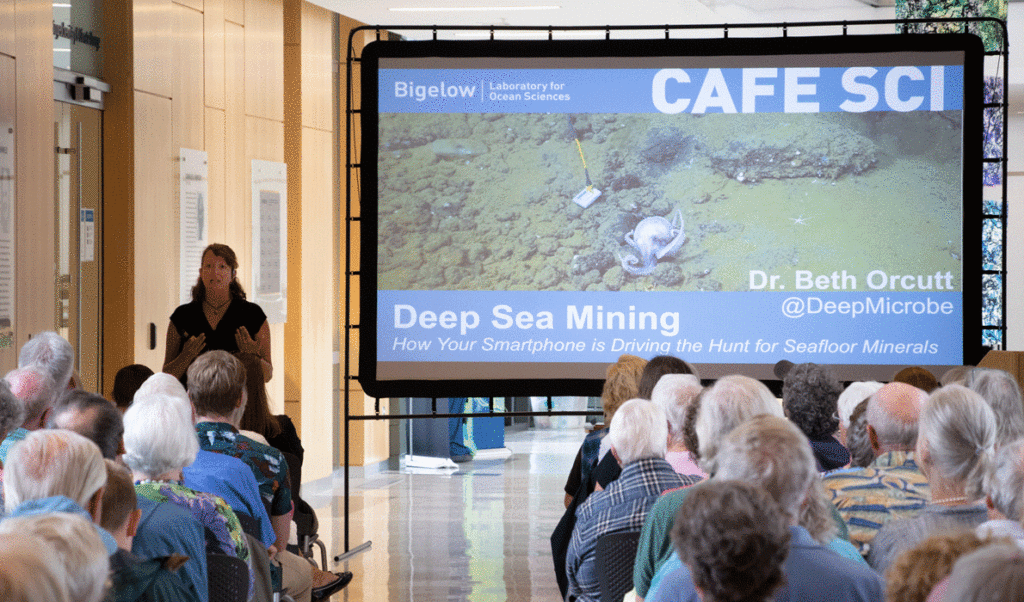Thousands of feet below the ocean’s surface, in the deep sea near hydrothermal vents, are increasingly coveted resources. As an international body met in mid-July to discuss how to manage these resources, members of the public met in East Boothbay to hear from a deep sea scientific researcher about what the potential impacts of deep sea mining may be on the world’s oceans.
The technology that increasingly dominates our world—smartphones, tablets, all-electric or hybrid-electric cars—have one thing in common: the lithium-ion battery. And the lithium-ion battery depends on metals such as nickel, cobalt, aluminum, and manganese, said Beth Orcutt, a geomicrobiologist working at Bigelow Laboratory for Ocean Sciences in East Boothbay.
The supply of these raw materials on land is under pressure, she told a group of about 120 people gathered for the lab’s summer-long Café Sci lecture series. The land-based supply or access to it cannot meet the demand.
And the demand is increasingly fiercer. According to analyses from Bloomberg and others, lithium-ion batteries are expected to dominate the battery market in a handful of years in part because they power today’s and the future’s technologies.
For the automotive industry alone, which expects sales of electric vehicles to boom as the cost of these cars drops, the energy capacity needed for lithium-ion batteries is expected to grow by nearly 22 percent annually by 2024, reports Navigant Research, a marketing research company.
Navigant also reports the global market for lithium-ion batteries for the automotive industry is estimated to grow from $7.8 billion in 2015 to $30.6 billion in 2024.
So, the commercial interest is there and growing, Orcutt said, and companies are looking to the deep sea to access the resources needed to make the batteries. A handful have already created and launched exploratory sea floor mining equipment prototypes, she said.
“This industry is happening,” she said. “It’s not just sci-fi anymore.”
Right now, no commercial deep sea mining efforts are currently allowed, she said, but it’s only a matter of time before that changes.
In fact, she told her audience, the International Seabed Authority (ISA), an intergovernmental body based in Kingston, Jamaica that regulates the international seabed beyond the boundaries claimed by countries, met in July to discuss potential rules to govern deep sea mining.
The deep sea is a largely unknown world in terms of human understanding, and little is known about how mining the seafloor would impact the ecosystems where the mining would take place, or, on a larger scale, the ocean itself, said Orcutt. A recent German study of a dredge of a deep sea manganese field showed no visible recovery of the area 35 years later, she noted.
As the ISA works on and considers regulating deep sea mining, consumers can take actions to use what is already available, thereby reducing the need for deep sea mining, she said.
“I think we need to be mindful as consumers about the impact of our purchases,” she said.
Instead of upgrading to the latest release of the iPhone, hold on to the one you have that works perfectly fine, for example, she said. Advocate for recycling programs for electric car batteries, and above all, recycle—don’t throw in the trash—lithium-ion rechargeable batteries.
WHERE TO RECYCLE LITHIUM-ION BATTERIES: Maine takes part in the nationwide battery recycling program, Call2Recycle. Consumers can recycle their batteries for free at locations across the state. Go to www.call2recycle.orgto learn more and find a location near you.





